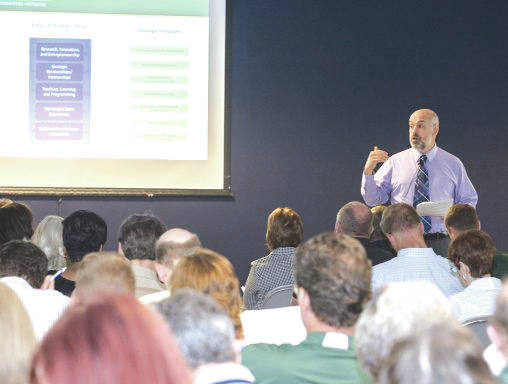
FAIRBORN — Expanding online courses, strengthening university-military partnerships and creating a health college are some of the projects prioritized in Wright State University’s proposed strategic plan.
These are among the 34 projects included in the proposed plan.
The focus of the plan, The Wright State Experience, emphasizes the university’s commitment to its students. The goal is to place students at the center of all aspects of the university’s mission and operations.
“The Wright State Experience is what differentiates us. When we are at our best, we provide powerful learning opportunities for our students. We integrate research and innovation, blend online and face-to-face learning, or mix practical experience with cutting-edge discovery,” said David Bright, co-chair of the Strategic Planning Steering Committee.
Representatives of the Strategic Planning Steering Committee presented the draft strategic plan to the Board of Trustees at its meeting on Oct. 19. The board will be asked to formally approve the plan, Wright Path to 2025: Pride, Transformation, Potential, at its public meeting on Dec. 14.
The plan is intended to be dynamic and will be updated as it is implemented. The plan will follow the calendar year, starting annually on Jan. 1. Each spring the university will hold a summit to review progress and recalibrate the plan. Each fall, Wright State will perform a review to track progress and make adjustments to the plan.
The proposed projects were narrowed from a larger list of ideas developed during the planning process. Projects are organized into three tiers to help the university determine short-term and long-term priorities.
The projects are organized around six strategic themes or pillars: collaborative delivery of services; research, innovation, and entrepreneurship; strategic relationships and partnerships; teaching, learning, and programming; student life and engagement; and strategic foundations. These pillars are an essential structure for delivering on The Wright State Experience.
One project would create a Wright State e-campus by providing high-quality online core courses and supporting an increasing portfolio of programs students can complete virtually. The goal of the project is to remove barriers to help students earn a college degree or credential.
Under another project, Wright State will explore the construction of a stand-alone recreation center emphasizing accessibility and student wellness. The infrastructure initiative will also address student dining facilities, programming spaces and places for students to connect or unwind.
Through the project, the university will seek to build a “rich campus environment that enhances all aspects of student life through a bold look at space and infrastructure.”
Wright State will also create a new health college by integrating health disciplines at the university. The new college will provide early inter-professional opportunities and flexible pathways for students who want to explore health professions while leveraging research and community partnerships.
Wright State will also strengthen university and U.S. military partnerships by ensuring that academic programs are aligned to meet the needs and strengths of service members. The university will recognize prior learning and experience, provide flexibility in programming and scheduling and create pathways that leverage military educational benefits.
The university will also seek new partnerships with local military leadership that promote career advancement through micro-credentialing and certificates that integrate into established degree programs. Together with government partners, Wright State will also pursue advanced research, development and commercialization.
Under the strategic plan, Wright State will strengthen the research enterprise by expanding and invigorating the breadth of services that support research, innovation, scholarship and creative activities at the university. The project includes creating a position of vice provost for research and innovation; reorganizing and developing research, scholarship, creative activities and strategic collaborations; and invigorating knowledge transfer and commercialization efforts.
The university will also redesign the transfer student experience by developing a comprehensive registration and orientation program to recognize and serve the unique needs of transfer students. Transfer students will receive focused academic advising, complete and timely transfer-credit evaluations, registration assistance and orientation to Wright State’s culture.


